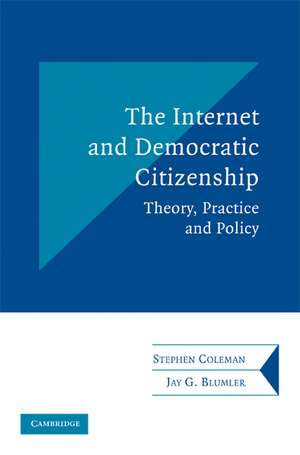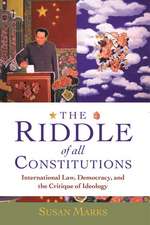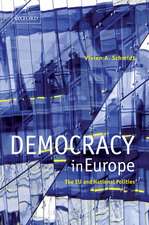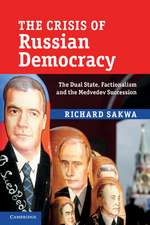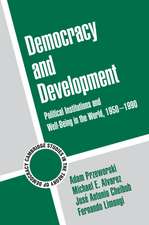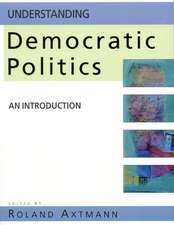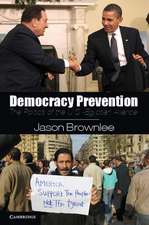The Internet and Democratic Citizenship: Theory, Practice and Policy: Communication, Society and Politics
Autor Stephen Coleman, Jay G. Blumleren Limba Engleză Paperback – 29 mar 2009
| Toate formatele și edițiile | Preț | Express |
|---|---|---|
| Paperback (1) | 226.68 lei 6-8 săpt. | |
| Cambridge University Press – 29 mar 2009 | 226.68 lei 6-8 săpt. | |
| Hardback (1) | 551.24 lei 6-8 săpt. | |
| Cambridge University Press – 5 apr 2009 | 551.24 lei 6-8 săpt. |
Din seria Communication, Society and Politics
-
 Preț: 188.94 lei
Preț: 188.94 lei -
 Preț: 207.35 lei
Preț: 207.35 lei -
 Preț: 177.14 lei
Preț: 177.14 lei -
 Preț: 192.21 lei
Preț: 192.21 lei -
 Preț: 227.23 lei
Preț: 227.23 lei -
 Preț: 388.16 lei
Preț: 388.16 lei -
 Preț: 204.48 lei
Preț: 204.48 lei - 11%
 Preț: 568.81 lei
Preț: 568.81 lei -
 Preț: 173.02 lei
Preț: 173.02 lei -
 Preț: 204.56 lei
Preț: 204.56 lei -
 Preț: 230.51 lei
Preț: 230.51 lei -
 Preț: 209.78 lei
Preț: 209.78 lei -
 Preț: 267.61 lei
Preț: 267.61 lei -
 Preț: 269.58 lei
Preț: 269.58 lei -
 Preț: 269.19 lei
Preț: 269.19 lei -
 Preț: 203.50 lei
Preț: 203.50 lei -
 Preț: 229.74 lei
Preț: 229.74 lei -
 Preț: 206.29 lei
Preț: 206.29 lei -
 Preț: 273.89 lei
Preț: 273.89 lei -
 Preț: 266.47 lei
Preț: 266.47 lei -
 Preț: 326.70 lei
Preț: 326.70 lei -
 Preț: 252.03 lei
Preț: 252.03 lei -
 Preț: 289.01 lei
Preț: 289.01 lei -
 Preț: 267.61 lei
Preț: 267.61 lei - 11%
 Preț: 558.08 lei
Preț: 558.08 lei -
 Preț: 265.70 lei
Preț: 265.70 lei -
 Preț: 288.04 lei
Preț: 288.04 lei -
 Preț: 313.10 lei
Preț: 313.10 lei
Preț: 226.68 lei
Nou
Puncte Express: 340
Preț estimativ în valută:
43.38€ • 45.12$ • 35.81£
43.38€ • 45.12$ • 35.81£
Carte tipărită la comandă
Livrare economică 14-28 aprilie
Preluare comenzi: 021 569.72.76
Specificații
ISBN-13: 9780521520782
ISBN-10: 0521520789
Pagini: 232
Ilustrații: 1 table
Dimensiuni: 152 x 229 x 13 mm
Greutate: 0.32 kg
Ediția:1
Editura: Cambridge University Press
Colecția Cambridge University Press
Seria Communication, Society and Politics
Locul publicării:New York, United States
ISBN-10: 0521520789
Pagini: 232
Ilustrații: 1 table
Dimensiuni: 152 x 229 x 13 mm
Greutate: 0.32 kg
Ediția:1
Editura: Cambridge University Press
Colecția Cambridge University Press
Seria Communication, Society and Politics
Locul publicării:New York, United States
Cuprins
1. Democracy's deliberative deficit; 2. A crisis of public communication; 3. From indirect to direct representation; 4. E-democracy from above; 5. E-democracy from below; 6. Shaping e-democracy.
Recenzii
'The potential for the Internet to support democracy is substantial, but as yet unrealized. The authors - two world-leading scholars of political communication - provide a penetrating synthesis of theory and research to explain the limitation of contemporary approaches to using the Internet and related media to enhance the communicative power of citizens. Their analysis leads to a bold prescription for creating a new civic commons 2.0 that will enable 'more deliberative democracy'. This is an excellent scholarly book that will stimulate and inform public debate in a vital area of communication research. It is must reading not only for students of the iternet, but also for anyone interested in the vitality of democratic institutions and processes.' William H. Dutton, Director, Oxford Internet Institute, University of Oxford
'A refreshingly new and exciting conceptualization of Democratic Citizenship and the potential of the Internet as a public sphere. Coleman and Blumler have written an inspiring, not-to-be-missed book that provides clear and sensible guidelines for creating a Civic Commons in cyberspace.' Doris A. Graber, University of Illinois at Chicago
'In this authoritative review of current practice and debates in e-democracy Stephen Coleman and Jay Blumer combine a powerful theoretical frame work with a hard-headed analysis of what works and what doesn't. Carefully avoiding technological determinism, they argue convincingly that the 'vulnerable potential' of the internet as a democratic tool will only be fulfilled through the establishment of an independent agency to develop, promote and oversee online deliberation.' Matthew Taylor, Chief Executive, Royal Society for the Encouragement of the Arts
'A refreshingly new and exciting conceptualization of Democratic Citizenship and the potential of the Internet as a public sphere. Coleman and Blumler have written an inspiring, not-to-be-missed book that provides clear and sensible guidelines for creating a Civic Commons in cyberspace.' Doris A. Graber, University of Illinois at Chicago
'In this authoritative review of current practice and debates in e-democracy Stephen Coleman and Jay Blumer combine a powerful theoretical frame work with a hard-headed analysis of what works and what doesn't. Carefully avoiding technological determinism, they argue convincingly that the 'vulnerable potential' of the internet as a democratic tool will only be fulfilled through the establishment of an independent agency to develop, promote and oversee online deliberation.' Matthew Taylor, Chief Executive, Royal Society for the Encouragement of the Arts
Notă biografică
Descriere
This book examines how the Internet can improve public communications and enrich democracy.
